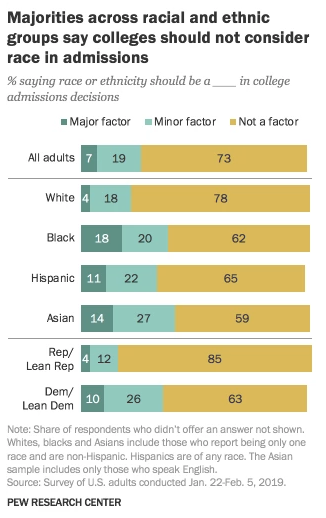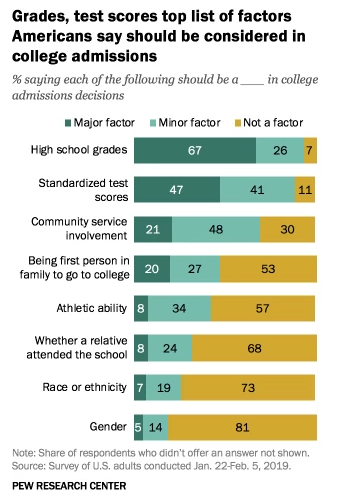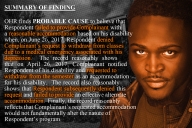You have /5 articles left.
Sign up for a free account or log in.
Seven percent of Americans believe that race or ethnicity should be a major factor in admissions decisions, and 19 percent believe it should be a minor factor.
Nearly three-fourths (73 percent) of a representative sample of Americans said that race or ethnicity should not be a factor, according to a survey released Monday by the Pew Research Center. Solid majorities of white, black, Latino and Asian Americans shared that view.
The finding is consistent with others but is the first national survey on the topic since the ending of the trial in a lawsuit against Harvard University charging that its affirmative action programs discriminate against Asian American applicants. (A decision in the case, which prompted much public discussion, is expected this spring.)
In 2016, after the last ruling by the U.S. Supreme Court affirming the right of colleges to consider race in admissions, Gallup conducted a poll of the public, with questions drafted in part by Inside Higher Ed. Nearly two-thirds of the public at that time said they disagreed with the Supreme Court. Asked about factors that should be considered in admissions decisions, only 9 percent said that race should be a major factor, and 27 percent said it should be considered a minor factor.
Polling results vary based on how questions are phrased. The new Pew study and the 2016 poll are specifically about what should be considered in admissions. More general questions have tended to find more support for affirmative action but can't be compared directly to the new study.
In 2014, Pew asked Americans, "In general, do you think affirmative action programs designed to increase the number of black and minority students on college campuses are a good thing or a bad thing?" With that as the question, 63 percent said these programs were "a good thing." Only Republicans were more likely to view them as a bad thing than as a good thing. That question could well have reflected support for recruitment efforts, and not necessarily consideration of race in the admissions process.
 In the new survey, Democrats as well as Republicans opposed the consideration of race in admissions, although Republicans were more negative than were Democrats.
In the new survey, Democrats as well as Republicans opposed the consideration of race in admissions, although Republicans were more negative than were Democrats.
The Pew survey also asked Americans what they thought should be major and minor factors in college admissions decisions.
Here, by far the factor with the most support was grades in high school, which 67 percent said should be a major factor, followed by standardized test scores, with 47 percent.
When it comes to criteria that go beyond academics, the share suggesting that various things should be major or minor factors dropped significantly. But nearly half (47 percent) said that being the first person in a family to go to college should be either a major or minor factor.
The Harvard trial has also focused attention on preferences there and at many other institutions for the children of graduates (so-called legacies) and for athletes.
While majorities of Americans opposed consideration of those factors in admissions, the shares were smaller than were those opposing consideration of race. While 73 percent opposed consideration of race, 68 percent opposed consideration of legacy status and 57 percent opposed consideration of athletic ability. While some groups are calling for an end to legacy preferences, and many academics dislike athletic preferences, these policies have to date not been successfully challenged in court.
 Edward Blum, who is the organizer of the lawsuit against Harvard, said that the Pew results didn't surprise him. He said his view was unchanged from a quote he gave in response to the poll after the last Supreme Court ruling.
Edward Blum, who is the organizer of the lawsuit against Harvard, said that the Pew results didn't surprise him. He said his view was unchanged from a quote he gave in response to the poll after the last Supreme Court ruling.
That quote: “Racial classifications and preferences are deeply unpopular with a significant majority of all Americans. It is to be hoped that the courts will soon end these divisive and unfair practices.”
Shirley J. Wilcher, executive director of the American Association for Access, Equity and Diversity, said via email that the way the questions were set up amounted to "cherry-picking different factors" as if a college would be using a sole factor to make its decisions.
It would be illegal, she said, for colleges to base decisions only on race, and surveys like this don't reflect the way colleges "are looking for diversity and a mélange of students’ interests, experiences and talents."
The law allows colleges to consider whether someone has science talent, or "is a tuba player from Montana." Consideration of race should also remain legal, she said. "An applicant to Harvard College who happens to be black (notwithstanding his/her income status) may undoubtedly face more discrimination shopping while black, being pulled over by police more often than her white counterpart, or simply being presumed to be less competent or qualified than his/her white counterpart. That is what a black person has to live with all of his/her life."
Added Wilcher: "Overcoming these barriers, as well as family challenges, having a disability or inadequate schooling, is just as valid a consideration for admission as being a rowing captain from a prestigious prep school. It shows intestinal fortitude and being motivated to succeed despite those obstacles."
OiYan Poon is assistant professor of higher education leadership and director of the Center for Racial Justice in Education and Research at Colorado State University, and writes extensively in support of affirmative action (including for Inside Higher Ed). She noted that different polls have made different findings, and pointed to data showing that Asian Americans (outside of Chinese Americans) support college affirmative action programs.
To the extent that the Pew survey shows public skepticism of affirmative action, Poon said that was because most members of the public do not understand the way holistic review is designed to consider race among a variety of factors, without any one factor dominating. "I believe there’s a fundamental public lack of understanding about how race-conscious holistic review" works, she said.
The Broader Context
Andrew B. Palumbo, dean of admissions and financial aid at Worcester Polytechnic Institute, said via email that his admissions team has been discussing the issue of public perceptions of the consideration of race and ethnicity. He noted a Gallup analysis last year that, reviewing numerous studies, found that Americans are more likely to support affirmative action when it is described "at a higher, more conceptual level." Skepticism grows when there is a "trade-off" suggested in questions, in which a college may not just be engaged in more outreach, but may be factoring race into decisions. Americans tend to believe some defined idea of merit is the norm in college admissions, when criteria are less clear in competitive admissions than most people imagine, he said.
Data from the National Association for College Admission Counseling's State of College Admission survey show that admissions leaders report that race and ethnicity is generally not a factor in admissions. Only 2.4 percent of colleges reported that race was a factor of considerable influence in admissions decisions, and another 13 percent said it was a factor of moderate influence. In contrast, 81 percent reported that high school grades were of considerable influence, and 52 percent said that standardized test scores were of considerable influence.








